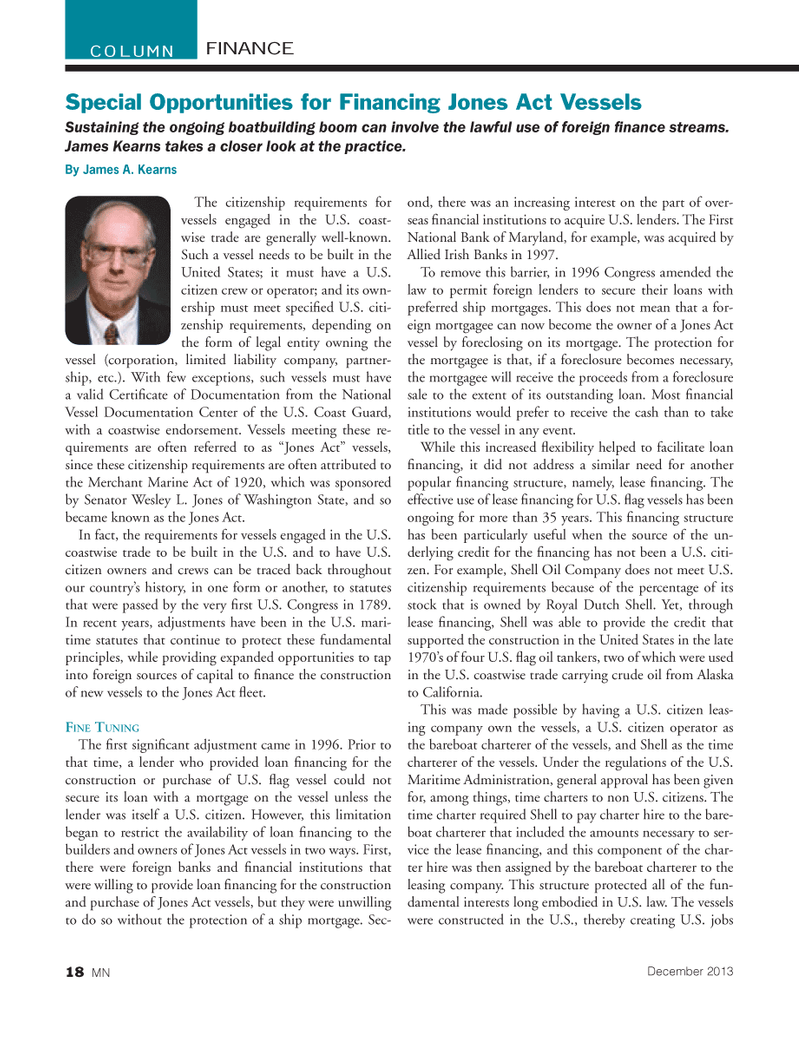
Page 18: of Marine News Magazine (December 2013)
Innovative Products & Boats of 2012
Read this page in Pdf, Flash or Html5 edition of December 2013 Marine News Magazine
The citizenship requirements for vessels engaged in the U.S. coast- wise trade are generally well-known. Such a vessel needs to be built in the United States; it must have a U.S. citizen crew or operator; and its own- ership must meet speciÞ ed U.S. citi- zenship requirements, depending on the form of legal entity owning the vessel (corporation, limited liability company, partner- ship, etc.). With few exceptions, such vessels must have a valid CertiÞ cate of Documentation from the National Vessel Documentation Center of the U.S. Coast Guard, with a coastwise endorsement. Vessels meeting these re- quirements are often referred to as ÒJones ActÓ vessels, since these citizenship requirements are often attributed to the Merchant Marine Act of 1920, which was sponsored by Senator Wesley L. Jones of Washington State, and so became known as the Jones Act. In fact, the requirements for vessels engaged in the U.S. coastwise trade to be built in the U.S. and to have U.S. citizen owners and crews can be traced back throughout our countryÕs history, in one form or another, to statutes that were passed by the very Þ rst U.S. Congress in 1789. In recent years, adjustments have been in the U.S. mari- time statutes that continue to protect these fundamental principles, while providing expanded opportunities to tap into foreign sources of capital to Þ nance the construction of new vessels to the Jones Act ß eet.FINE TUNINGThe Þ rst signiÞ cant adjustment came in 1996. Prior to that time, a lender who provided loan Þ nancing for the construction or purchase of U.S. ß ag vessel could not secure its loan with a mortgage on the vessel unless the lender was itself a U.S. citizen. However, this limitation began to restrict the availability of loan Þ nancing to the builders and owners of Jones Act vessels in two ways. First, there were foreign banks and Þ nancial institutions that were willing to provide loan Þ nancing for the construction and purchase of Jones Act vessels, but they were unwilling to do so without the protection of a ship mortgage. Sec- ond, there was an increasing interest on the part of over- seas Þ nancial institutions to acquire U.S. lenders. The First National Bank of Maryland, for example, was acquired by Allied Irish Banks in 1997. To remove this barrier, in 1996 Congress amended the law to permit foreign lenders to secure their loans with preferred ship mortgages. This does not mean that a for- eign mortgagee can now become the owner of a Jones Act vessel by foreclosing on its mortgage. The protection for the mortgagee is that, if a foreclosure becomes necessary, the mortgagee will receive the proceeds from a foreclosure sale to the extent of its outstanding loan. Most Þ nancial institutions would prefer to receive the cash than to take title to the vessel in any event. While this increased ß exibility helped to facilitate loan Þ nancing, it did not address a similar need for another popular Þ nancing structure, namely, lease Þ nancing. The effective use of lease Þ nancing for U.S. ß ag vessels has been ongoing for more than 35 years. This Þ nancing structure has been particularly useful when the source of the un- derlying credit for the Þ nancing has not been a U.S. citi- zen. For example, Shell Oil Company does not meet U.S. citizenship requirements because of the percentage of its stock that is owned by Royal Dutch Shell. Yet, through lease Þ nancing, Shell was able to provide the credit that supported the construction in the United States in the late 1970Õs of four U.S. ß ag oil tankers, two of which were used in the U.S. coastwise trade carrying crude oil from Alaska to California.This was made possible by having a U.S. citizen leas- ing company own the vessels, a U.S. citizen operator as the bareboat charterer of the vessels, and Shell as the time charterer of the vessels. Under the regulations of the U.S. Maritime Administration, general approval has been given for, among things, time charters to non U.S. citizens. The time charter required Shell to pay charter hire to the bare- boat charterer that included the amounts necessary to ser- vice the lease Þ nancing, and this component of the char- ter hire was then assigned by the bareboat charterer to the leasing company. This structure protected all of the fun- damental interests long embodied in U.S. law. The vessels were constructed in the U.S., thereby creating U.S. jobs Special Opportunities for Financing Jones Act Vessels Sustaining the ongoing boatbuilding boom can involve the lawful use of foreign Þ nance streams. James Kearns takes a closer look at the practice. By James A. KearnsFINANCECOLUMN18 MNDecember 2013MN Dec2013 Layout 18-31.indd 18MN Dec2013 Layout 18-31.indd 1811/25/2013 12:42:16 PM11/25/2013 12:42:16 PM

 17
17

 19
19
